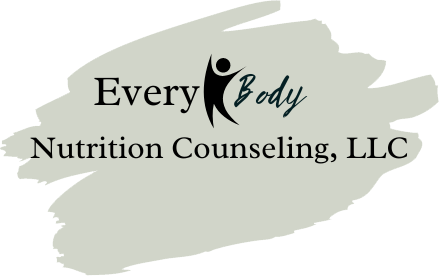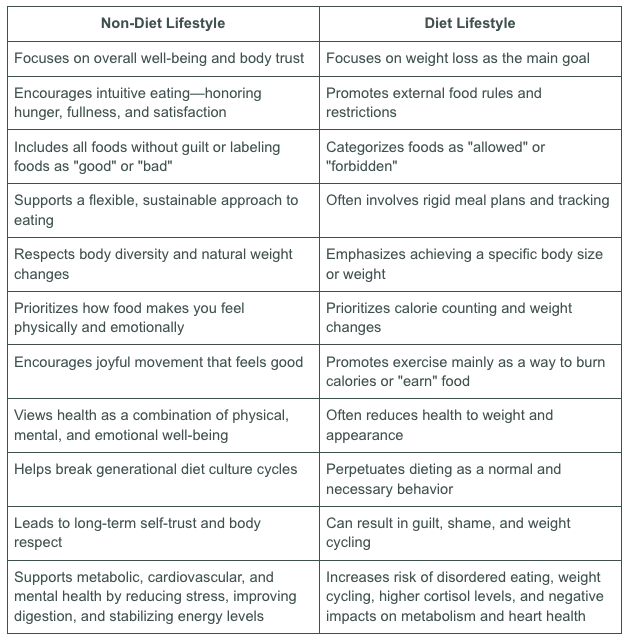How to Build a Healthier Relationship with Food & Your Body
In the last blog, you had the opportunity to take a quiz that helped assess how much diet culture is impacting you. If you missed it, you can check it out here. Your results may have brought up some new and/or difficult emotions. Diet culture is so ingrained in our lives that we often don’t even realize it’s there and that it may be negatively impacting us. It has given us the illusion that it’s necessary and that not participating in it means you don’t care about your health. While I don’t believe anyone has to work toward a "healthier lifestyle," if it’s something you care about, un-dieting your life does NOT mean not caring about your health.
To help break this down further, I’ve created a side-by-side comparison of a non-diet lifestyle vs a diet lifestyle:
Feeling ready to start moving away from diet culture? Let’s get into some tangible action steps!
Recognizing Diet Culture in Daily Life – Common signs, like guilt around eating certain foods or the pressure to “burn off” meals.
Diet culture is everywhere—in conversations, advertisements, social media, and even well-meaning advice from friends, family, and medical providers. Start noticing messages that:
Label foods as “good” or “bad.”
Suggest that weight loss is the key to happiness or health.
Promote the idea that eating certain foods requires “earning” or “burning” them off.
Awareness is the first step toward change!
Reframing Food & Body Talk – Language shifts that help foster a more positive food environment, especially for families.
I wish there was a magical way to remove all these lingering diet thoughts and eliminate the knee-jerk reaction to negative body image thoughts. But unfortunately, unlearning takes time, and healing is not linear. At times, you may take a few steps backward—and that is SO normal! In the world of dieting, steps backward often trigger thoughts like, “I failed at this diet, so I’ll just give up and eat all the things I’ve been restricting,” pulling you back into the never-ending dieting cycle.
But in Intuitive Eating and a non-diet approach, there is no "pass or fail." Setbacks are part of the process and will ultimately help you grow stronger.
To practice reframing, consider a common thought you have about dieting or your body. See if you can poke holes in the thought and reframe it with something that feels authentic to you. Below are some examples of common thoughts and possible reframes. The key is that it needs to feel authentic to you!
Food-Related Reframes:
❌ Common Thought: "I can’t trust myself around sweets—I’ll just eat them all."
🔄 Authentic Reframe: "It makes sense that I feel out of control around sweets since I’ve labeled them as off-limits. Maybe if I let myself have them more often, they wouldn’t feel so intense."
❌ Common Thought: "I skipped my workout today, so I shouldn’t eat so much."
🔄 Authentic Reframe: "It’s hard to unlearn the idea that food and exercise have to be ‘earned,’ but my body still deserves nourishment, no matter what."
❌ Common Thought: "I have no willpower when it comes to food."
🔄 Authentic Reframe: "I’ve been taught to see my eating as a discipline issue, but maybe my body is just asking for something I haven’t been giving it."
Body Image Reframes:
❌ Common Thought: "I need to lose weight before I can feel good about myself."
🔄 Authentic Reframe: "I don’t love how I feel in my body right now, but I can start treating it with kindness even if my feelings haven’t caught up yet."
❌ Common Thought: "I hate how my body looks in these clothes."
🔄 Authentic Reframe: "It’s frustrating when clothes don’t fit the way I want them to. Maybe I deserve clothes that fit me instead of trying to fit into them."
❌ Common Thought: "I should look like I did years ago."
🔄 Authentic Reframe: "I miss how I used to look, and that’s okay. But my body has carried me through a lot, and maybe I can start appreciating that."
Practicing Permission with Food – Steps to neutralize "forbidden" foods and reduce the fear around them.
The concept of "unconditional permission to eat" can feel overwhelming and daunting. If that feels uncomfortable, start with considering what foods are actually appealing. Think about flavors, temperature, texture, and volume. In the world of dieting, we rarely consider what we want to eat, so take your time with this question and revisit it every time you plan to eat. Practice acknowledging the answer, and if you’re able, honor it!
Listening to Your Body – Introducing hunger, fullness, and satisfaction cues.
When you’re dieting, hunger becomes something to fear. But in reality, hunger is a cue from your body telling you it needs energy and nutrients. Hunger can feel different for each person and varies in intensity. I recommend using a hunger scale to get familiar with these signals:
1 = Ravenous, shaky, painfully hungry
2 = Very hungry, irritable, hard to focus
3 = Politely hungry, able to consider what sounds appealing
4 = Early hunger signals—thinking about food (this is a great time to start preparing food)
5 = Neutral, midway through your meal
Fullness is also often feared among dieters. If you constantly use external indicators of how much to eat, it can take time to recognize that "just right" amount of food that leaves you feeling energized, comfortable, and ready to move on. Here’s the fullness side of the scale:
6 = Starting to feel full, nearing the last bite
7 = Feeling comfortable, energized, and satisfied
8 = A little too full, but not unpleasant yet
9 = Unpleasant level of fullness
10 = Painful level of fullness
It may help to keep a journal and note your hunger and fullness throughout the day. This isn’t meant for self-judgment, but as a way to practice pausing and assessing these feelings.
Learning to recognize and honor hunger and fullness cues is an important step in breaking free of diet culture. But here’s the thing: we don’t eat just for biological hunger. Emotional eating gets a bad reputation, but the truth is, eating is always emotional, and that’s okay. This will be the focus of a future post!
Handling Triggers & Social Pressure – How to respond when faced with diet talk from friends, family, or media.
This will vary a lot depending on the situation and personalities involved. Here are a few ideas:
For new non-dieters and/or a non-confrontational approach:
Mentally acknowledge the diet talk and practice reframing the message. For example, when someone in a smaller body than yours comments about needing to lose more weight, reframe it as:
"It sounds like they’re feeling pressured by diet culture too. Bodies come in all shapes and sizes, and weight doesn’t determine health or worth."
Or, if it feels right, you might respond with something neutral like,
"It’s tough how much pressure there is around weight. I’m working on seeing my body with more kindness."
The goal is to shift your internal dialogue away from comparison or self-doubt and toward a more compassionate, non-diet perspective.
If you feel more bold:
You could gently challenge the comment with something like,
"It’s interesting how diet culture makes us feel like we’re never enough, no matter our size."
Or, if you feel comfortable, ask a reflective question like,
"Do you think the pressure to always shrink our bodies is really helping us feel better?"
This approach can plant a seed of curiosity without turning the conversation into a debate. The key is to honor your own boundaries while staying true to your values.
Setting Boundaries:
Sometimes, we need to set boundaries with people in our lives. Here are some ways to communicate those boundaries:
With Friends:
“Hey, I’m working on having a healthier relationship with food and my body, so I’d prefer not to talk about diets or weight. Can we focus on something else?”
“I get that dieting is a big part of our culture, but I’m working on a different approach. I’d love it if we could keep our conversations free of diet talk.”
“I’m happy to chat about food, but I prefer to focus on how it makes us feel rather than weight or calories.”
With Family:
“I know you mean well, but comments about my body (or what I’m eating) aren’t helpful. Let’s talk about something else.”
“I’m working on unlearning diet culture, so I’d appreciate it if we could avoid weight or diet conversations.”
“I love spending time together, but when diet talk comes up, it makes it harder for me to enjoy it. Can we change the subject?”
With Medical Providers:
“I’m not interested in discussing weight loss. Can we focus on my health concerns without making weight the focus?”
“I follow a weight-inclusive approach to health. I’d appreciate recommendations that don’t center on weight or dieting.”
“I understand that weight is often mentioned in healthcare, but I’d prefer to focus on behaviors and lab work rather than the number on the scale.”
Final Thoughts:
I want to note that this is HARD. These thoughts and concepts have been ingrained in us since early childhood as fact, so this process of unlearning is going to take time. You may find that having additional support through the process makes it more doable. If you’re seeking more support, book a visit today! I’d love to support you on this journey. And, since I take insurance, financial barriers don’t need to stand in your way!



